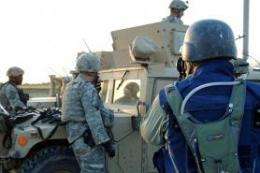Freedom to Report From War Zone Not Always Closely Controlled

(PhysOrg.com) -- Most journalists embedded with U.S. troops in Iraq say the government has not controlled their reporting, even while violence escalated mid-way through the war, according to a study co-authored by a University of Arizona journalism professor.
In a study published in the recent issue of The International Communication Gazette, Associate Professor Shahira Fahmy at the UA School of Journalism and Tom Johnson from the University of Texas at Austin compared results of two surveys. One survey was of journalists embedded with the military in late 2005-06, the other taken in early 2004. The surveys examined whether the embeds' opinions toward press freedom changed over time and whether they believe government news management has increased as criticism of the Iraq War has increased and public support has declined.
In the more recent survey of 118 embedded reporters, about six out of 10 journalists said they experienced little or no government control of their reporting, and about half said there was little or no self-censorship. Seven out of 10 believed the public has been properly informed of events in Iraq. About 80 percent of the journalists said the embed program has been a success, providing more access and less control than in previous wars.
Journalists' views changed little from the invasion stage to the occupation stage of the war. If anything, journalists felt that government control was even less of a problem in late 2005-06 as violence escalated in Iraq, than in early 2004.
While the journalists expressed support for a free press and unfettered access, at least in principle, most agreed that the public's right to know should be balanced with the military's need to protect national security.
Many journalists, however, did express frustration at the restrictions in information inherent in the embed process, such as having to rely on the military for transportation and the prohibition of taking photos of battle scenes that included U.S. casualties. About a quarter of the journalists said government control was a serious concern in the war coverage.
"It is ironic that the Internet allowed reporters to send stories more easily back home, but it also made it possible for commanders and soldiers to read these stories online immediately, often leading to retributions against them," Fahmy said. "For example, some embeds reported they were then no longer able to accompany troops on patrol and/or were ordered to leave camp."
Fahmy and Johnson found that journalists who were most satisfied with the government considered the ground rules restrictions necessary to maintain their safety and the safety of the troops as well as operational security. The factor that most affected journalists' ability to report freely was perceived to not be primarily the fault of the U.S. government, embeds explained, but mainly threats from insurgents, particularly as enemies began kidnapping and killing reporters.
The Iraq embed program was initiated because journalists complained of increased military control in the past 30 years. The press was barred from the U.S. invasion of Granada in 1983 and Panama in 1989. The military imposed strict controls on the press during the Persian Gulf War in 1991 through press pools.
In Iraq, embedded reporters are allowed to accompany troops as long as they agree to some restrictions, such as not reporting troop movements. Critics say the embed program provides Americans a skewed and sanitized portrayal of the war, and some research has found the reporting from embed reporters to be more positive toward the U.S.
"The rise of the insurgency added to the reporting issues journalists faced in Iraq," Fahmy said. "The lack of security limited who the embeds could talk to, and this changing nature of the embed system put pressure on reporters to believe even more that the government had limited control on covering the conflict."
For example one embed explained the following:
"First, it's very dangerous out there. Only an idiot would traipse around Iraq without consulting the military. Second, most reporters, including yours truly, haven't served a day in uniform, and aren't trained to follow active units engaged in live combat. There is a thin line between covering a story and endangering both soldiers - those in the immediate vicinity and those who might possibly have to be sent to find you - as well as yourself by somehow deciding that ‘you have the right to go where you want to go' unassisted and unescorted and unadvised. You do have that right - but it's a fool's errand."
Fahmy and Johnson conducted the research through Web-based surveys.They identified 302 journalists embedded with the U.S. military in their second survey and had contact information for 227 of them, achieving a 52 percent response rate for the 118 journalists who completed the online questionnaire.
More information: Johnson, T. J., & Fahmy, S. (2010). When 'good' conflicts go bad: Testing a frame-building model on embeds' attitudes toward government news management in the Iraq War. The International Communication Gazette, 72 (6).
Provided by University of Arizona















